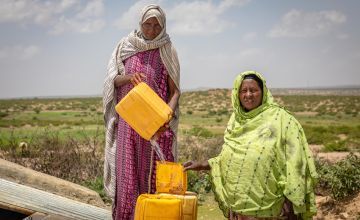
Read our 2024 annual report

Knowledge Hub
The world’s poorest people must not be forgotten by global leaders at COP26

Global leaders must commit adequate funding at this week’s COP26 climate change summit in Glasgow, to protect some of the world’s poorest people from the impact of climate crisis which is currently threatening the future of millions of lives, Concern Worldwide has warned.
“Climate change is now a major driver of hunger, with many of the world’s poorest communities engaged in the fight of their lives,” Concern Chief Executive Dominic MacSorley said. “The subsistence farmers, the coastal communities -- those most dependent on the seasons and closest to the elements are the ones that are already being decimated by the climate crisis.
“Whether it is rising sea levels in Bangladesh, prolonged drought in East Africa or desertification across the Sahel, the mounting effect of climate breakdown is already leading to the loss of crops, livelihoods, increased hunger, and even starvation.”
Concern is urging global leaders to commit adequate funding at COP26 to enable the world’s poorest countries adapt to protect their populations from the impact of climate crisis and to mitigate the impacts they are currently experiencing.
Climate Justice
“This is the moment of political reckoning, a time to hold polluters to account and to meet the needs of the most vulnerable,” Mr MacSorley said. “This is a matter of climate justice – the countries currently bearing the brunt of climate crisis are the ones which have contributed least to global warming, and do not have the resources to adapt.”
Climate models project higher average temperatures in most land and ocean regions, hot extremes in the majority of inhabited regions, and heavy precipitation and ever-greater probability of drought in some areas.
A recent analysis showed that climate change could increase the number of chronically hungry people in 2050 by 78 million unless action is taken.
In 2009, high-income countries made a commitment to allocate $100 billion annually by 2020 to help developing countries address the impacts of climate change. However, this commitment has never been met. “Financial commitments made in the coming days in Glasgow must be delivered on,” Mr MacSorley said.
Climate Adaptation
Concern’s work on the ground with communities facing the challenges of climate crisis includes a range of adaptation, resilience building and disaster risk management projects.
“From the construction of underground tanks to harvest rain water and the introduction of more drought-resistant plants and animals, to the establishment of early warning systems and the construction of flood protection, these measures are enabling communities to adapt in some of the most challenging environments,” he said.
“Time is running out for the world’s poorest,” Mr MacSorley said. “Their needs must be addressed as a top priority this week by global leaders.”
For media queries contact Eamon Timmins, Media Relations Manager, Concern Worldwide, at eamon.timmins@concern.net or 087 9880524
Other ways to help
Corporate support
Is your company interested in working together for a common cause?
Fundraise for Concern
From mountain trekking to marathon running, cake sales to table quizzes, there are lots of ways you can support our work.
Buy a gift
With an extensive range of alternative gifts, we have something to suit everybody.
Leave a gift in your will
Leave the world a better place with a life-changing legacy.
Volunteer with Concern
The lots of ways to get involved with our work as a volunteer
School fundraising
Without the generous support from schools, we wouldn't be able to do the work that we do.

